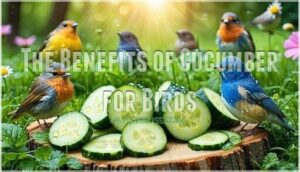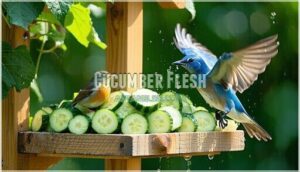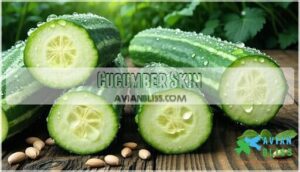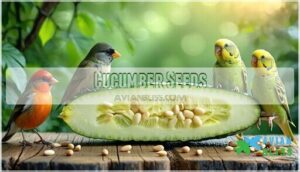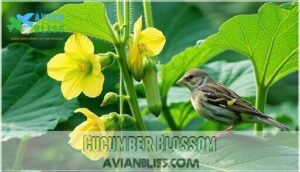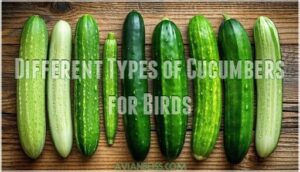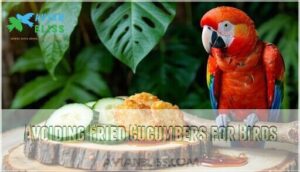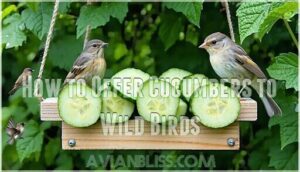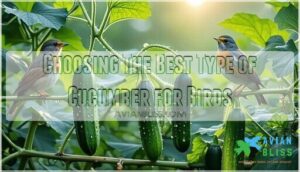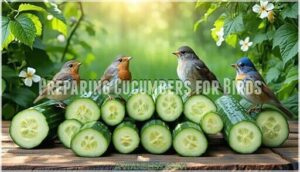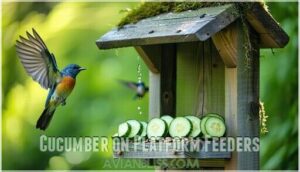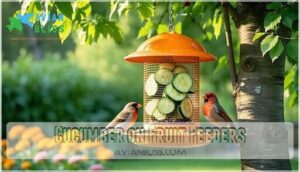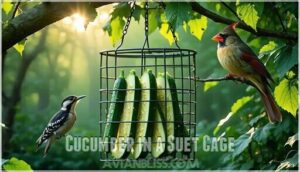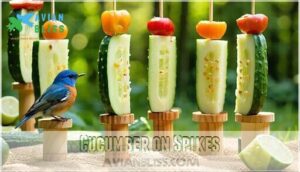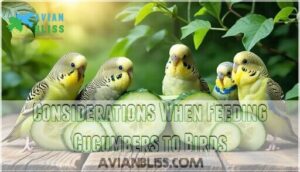This site is supported by our readers. We may earn a commission, at no cost to you, if you purchase through links.
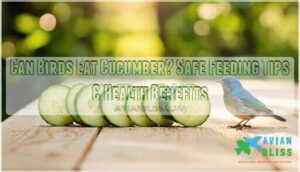
This water-rich vegetable provides essential vitamins like vitamin K, potassium, and antioxidants that support your feathered friends’ health.
You can offer cucumber to both wild and pet birds, but it should supplement—not replace—their regular diet.
Fresh, organic cucumber works best, and you can serve it peeled or unpeeled, sliced or chunked depending on the bird species.
The high water content makes cucumber especially valuable during hot weather when birds need extra hydration.
However, proper preparation and feeding methods can make all the difference in how well your birds enjoy this healthy snack.
Table Of Contents
- Key Takeaways
- Can Birds Eat Cucumber?
- The Benefits of Cucumber for Birds
- Which Parts of a Cucumber Do Birds Eat?
- Different Types of Cucumbers for Birds
- Avoiding Fried Cucumbers for Birds
- How to Offer Cucumbers to Wild Birds
- Choosing The Best Type of Cucumber for Birds
- Preparing Cucumbers for Birds
- Different Ways to Offer Cucumbers to Birds
- Considerations When Feeding Cucumbers to Birds
- Frequently Asked Questions (FAQs)
- Conclusion
Key Takeaways
- You can safely feed birds cucumber as a hydrating treat, but you’ll need to choose organic varieties and remove any waxy coating from store-bought cucumbers to avoid pesticide exposure.
- You should cut cucumber into appropriate sizes for different bird species – small pieces for finches and larger chunks for crows – and serve it fresh rather than processed or fried.
- You’ll get the best results by offering cucumber 1-2 times per week as a supplement to regular bird food, not as a replacement, since it’s 95% water with limited nutritional value.
- You can present cucumber using various methods like platform feeders, fruit feeders, or suet cages, but you should always remove spoiled pieces within 24 hours to prevent bacterial growth.
Can Birds Eat Cucumber?
Yes, birds can safely eat cucumber as an occasional treat.
This water-rich vegetable provides excellent cucumber hydration, especially during hot weather.
While not all birds show strong bird preferences for cucumber, species like robins, starlings, and crows will nibble on it.
For safe quantities, offer small pieces sparingly – cucumber’s 95% water content can cause digestive upset if overfed.
Both wild vs pet birds can enjoy cucumber, though pet birds need smaller portions.
Remove seeds for parakeets due to amygdalin concerns, making seed safety important.
Fresh, organic cucumber for birds works best as safe bird food, supporting overall bird nutrition without replacing their main bird diet when feeding birds properly.
Similarly, cooked potatoes offer benefits as a supplemental food source.
The Benefits of Cucumber for Birds
Offering cucumbers to birds provides several important health benefits that make this common garden vegetable a valuable addition to their diet.
You’ll find that cucumbers serve as an excellent source of hydration and essential nutrients while supporting your feathered visitors’ overall well-being.
Feed Only Fresh Cucumber to Birds
When you’re choosing cucumber for birds, freshness matters more than anything else.
Fresh cucumbers pack maximum water content and nutrients while avoiding spoiled produce that could harm your feathered visitors.
Here’s why fresh cucumber beats older options:
- Maximum hydration – Fresh cucumbers contain up to 96% water content
- Peak nutrition – Vitamins and minerals haven’t degraded over time
- Safe consumption – Avoid spoiled cucumber that breeds harmful bacteria
- Better taste – Birds prefer crisp, fresh textures over mushy alternatives
Organic preferred when possible, but any fresh cucumber works well.
Parrots enjoy them and benefit from the cucumber’s high nutrients.
Check for firm skin and avoid waxed cucumbers unless you plan proper preparation methods.
Your backyard birds will thank you for serving safe bird food that keeps them healthy and hydrated.
Peel Waxed Cucumbers Before Feeding Them to Birds
Store-bought cucumbers often carry a waxy coating that contains petroleum-based compounds and pesticide residue.
This wax composition creates pesticide risks for birds since washing proves ineffective at removing these embedded chemicals.
You’ll need to peel waxed cucumbers completely before offering them to your feathered visitors, as the peel traps harmful substances that can’t be scrubbed away with water alone.
Safe preparation means removing every bit of that waxy layer to ensure the cucumbers are safe for consumption, and organic alternatives eliminate these concerns entirely.
When you’re working with nonorganic cucumbers, peeling becomes your best defense against chemical exposure.
Feed Only Organic Cucumbers to Birds
Organic cucumbers eliminate pesticide risks that threaten bird health.
Unlike conventional varieties with chemical residue, organic options provide safe feeding without harmful toxins.
Always wash and peel non-organic cucumbers before serving.
Choosing organic cucumbers guarantees your feathered friends receive clean nutrition while avoiding dangerous pesticides that accumulate in their systems.
Which Parts of a Cucumber Do Birds Eat?
When you’re curious about which cucumber parts birds actually consume, you’ll find they’re surprisingly selective eaters.
Birds typically target the water-rich flesh and nutritious seeds while showing varying preferences for skin and blossoms based on their species and individual needs.
Cucumber Flesh
Birds absolutely love the juicy, water-rich interior that makes up most of the cucumber. The flesh provides excellent hydration while delivering vitamins and minerals your feathered friends need.
This soft texture makes cucumber flesh easily digestible for birds of all sizes.
When preparing cucumber flesh for birds, consider these feeding methods:
- Cut into small, manageable pieces for easy consumption
- Remove from center using a spoon to expose maximum flesh
- Slice thinly so smaller birds can access the nutrients
- Serve fresh to maintain peak nutrient density
- Mix with other fruits for varied feeding amounts
The flesh offers the highest water content, making it perfect for keeping birds hydrated during hot weather while providing safe consumption opportunities. While cucumbers offer limited nutrition, they’re a refreshing treat for many birds, serving as a refreshing and healthy snack that is also easily digestible and provides excellent hydration.
Cucumber Skin
Clean, organic cucumber skin is safe and nutritious for birds.
Wild birds occasionally damage cucumber skins in vegetable gardens, while some species peck through to reach flesh inside. However, pesticide concerns make waxed removal essential for store-bought varieties.
Organic preferred options eliminate chemical residues that harm birds. The skin contains beneficial nutrients like vitamins and fiber, but digestibility factors require proper preparation.
Thoroughly wash before serving, or peel non-organic cucumbers completely to guarantee safety.
Cucumber Seeds
Most birds can safely eat cucumber seeds, which provide protein, healthy fats, and fiber.
However, parakeet owners should exercise caution due to seed amygdalin content that can be harmful to these sensitive birds.
Here are three key points about cucumber seeds for birds:
- Wild Birds Thrive: Most wild birds digest cucumber seeds easily and benefit from their nutritional value
- Parakeet Concerns: Remove seeds for parakeets since amygdalin compounds can cause digestive issues
- Seed Preference: Many birds show strong seed preference, making cucumber seeds an appealing natural treat
Cucumber Blossom
Yellow cucumber blossoms aren’t just pretty garden decorations – they’re actually edible treats that birds can safely enjoy.
When you’re tending your organic cucumber plants, you might notice feathered visitors sampling these delicate flowers during the pollination process.
- Blossom nectar provides natural sugars and hydration for visiting birds
- Garden birds may nibble blossoms while attracting pollinators to your plants
- Bird damage to developing blossoms can reduce cucumber production if excessive
While birds eat cucumber blossoms occasionally, this behavior typically indicates they’re seeking moisture rather than considering the flowers a primary food source.
Different Types of Cucumbers for Birds
Understanding the various cucumber varieties available helps you make better choices for your feathered friends.
Slicing cucumbers provide excellent hydration and are readily available year-round.
English cucumbers offer thin, edible skins that eliminate preparation time, while pickling cucumbers deliver concentrated nutrition in smaller portions perfect for tiny beaks.
Seedless cucumbers reduce choking hazards while maintaining nutritional value, and organic cucumbers guarantee no harmful pesticides reach your birds.
Each variety brings unique textures and flavors to keep feeding interesting while supporting avian health through diverse nutrition and providing excellent choices.
Avoiding Fried Cucumbers for Birds
When preparing cucumbers for birds, skip anything fried or heavily processed. Fried Food Dangers present serious health risks – the oils used in frying can coat your bird’s digestive system and prevent proper nutrient absorption. Oil Toxicity becomes a real concern when birds consume foods cooked in heavy fats.
Skip the fryer when feeding birds – those oils spell trouble for tiny digestive systems!
Fried cucumber chips or tempura might seem like fun treats, but they’ll cause hyperactivity and digestive upset in your feathered friends. The breading and oils trigger Nutritional Loss by overwhelming their systems with empty calories they can’t properly process.
Safe Cooking Methods for birds mean keeping things simple. Raw cucumber provides maximum hydration and nutrients without the risks. Your bird’s delicate digestive system wasn’t designed to handle deep-fried foods – what tastes good to us can spell trouble for them.
Instead of processed options, focus on Alternative Bird Treats like fresh cucumber slices, chopped pieces, or frozen cucumber chunks for hot days. These healthy bird treats support proper avian diet needs while keeping your bird feeding tips simple and safe. Fresh beats fried every time regarding cucumber preparation for birds.
How to Offer Cucumbers to Wild Birds
Successfully offering cucumbers to wild birds requires strategic Feeder Placement and proper preparation.
Position cucumber pieces on platform feeders or bird tables where backyard birds can easily access them.
Your Slicing Methods matter—cut cucumbers into small, manageable pieces for different Bird Preferences, as smaller garden birds struggle with large chunks.
Consider these bird feeding tips:
- Choose organic cucumbers to avoid pesticide residue
- Wash thoroughly and remove waxy coatings from store-bought varieties
- Place pieces on elevated platforms away from ground contamination
- Refresh daily, removing spoiled portions within 24 hours
- Position feeders near natural shelter like trees or bushes
- Provide as supplement alongside other Alternative Foods and reliable Water Source
- Monitor consumption patterns to adjust serving sizes appropriately
Wild birds appreciate cucumber’s high water content, especially during hot weather when natural hydration sources become scarce.
Supplemental feeding increases bird survival rates by providing essential nutrition.
Choosing The Best Type of Cucumber for Birds
When selecting cucumbers for your feathered visitors, you’ll want to prioritize organic varieties to avoid harmful pesticides and chemical residues.
Fresh, unwaxed cucumbers provide the safest option since conventional cucumbers often contain petroleum-based wax coatings that can harm birds.
Best Cucumber Type?
Fresh garden cucumbers offer the best nutritional value for birds.
Bush Pickle and Lemon cucumber varieties provide sweet, smooth flesh that birds find appealing.
English cucumbers work well due to their thin skin, while Persian cucumbers offer concentrated nutrients.
Regular slicing cucumbers are suitable when fresh, and you should choose varieties based on your garden’s growing conditions and local bird preferences for ideal results.
Organic Vs. Store-bought?
Organic cucumbers eliminate pesticide exposure and chemical residue risks that harm birds.
Store-bought cucumbers often contain wax coatings and pesticides that washing can’t fully remove.
Organic nutrients provide better health benefits without toxic substances, making them the safest choice for feeding birds naturally, as organic cucumbers remain the best option.
How to Prepare?
Wash thoroughly with clean water to remove dirt and chemical residues. Organic is preferred to eliminate pesticide exposure risks.
Remove wax coating from store-bought cucumbers since it contains harmful substances.
Cut size should match bird species – small pieces for finches, larger chunks for crows. Freshness matters most; discard any soft or spoiled portions before serving to ensure the birds’ health and safety, which is the key to their well-being.
Preparing Cucumbers for Birds
Proper preparation guarantees birds can safely access and digest cucumber while maximizing its nutritional benefits.
You’ll need to ponder whether to peel the skin, how to cut the cucumber, and which serving method works best for different bird species, considering complete concepts for each.
Peeled or Unpeeled?
When deciding whether to peel cucumbers for birds, reflect on pesticide exposure and wax concerns first. Non-organic cucumbers often contain harmful chemicals that can affect bird health. Organic cucumber varieties offer the safest option since they lack pesticide residue and artificial wax coatings.
It’s important to think about using bird-safe pest control to protect your feathered friends.
Here are key considerations for peeling decisions:
- Organic preferred – Leave skin on organic cucumbers for maximum nutrient differences
- Pesticides require peeling – Always remove skin from conventionally grown cucumbers
- Waxed cucumbers need attention – Peel store-bought varieties with waxy coatings
- Peeling benefits include safety – Removes potential toxins while maintaining hydration value
English and Persian cucumber varieties have thinner, more digestible skins that birds can safely consume when organic.
Cucumber Slices
Cucumber slices offer birds the perfect bite-sized snack for easy consumption.
Cut cucumbers into quarter-inch thick rounds to match most birds’ preferences.
This slice size allows small songbirds to grip pieces comfortably while giving larger species manageable portions.
Fresh slicing preserves maximum hydration benefits, making each piece a rejuvenating treat.
Consider buying related products for your feathered friends.
Safe slicing with clean knives prevents contamination, ensuring your feathered visitors enjoy healthy cucumber snacks, and providing them a perfect way to consume cucumbers.
Cucumber Halves
Cutting cucumber halves offers birds a perfect balance between accessibility and presentation.
Size matters when serving these safe halves – they’re large enough for bigger birds like crows to grip easily while exposing fresh, hydrating flesh.
Birds show clear preferences for halves freshness over convenience, so serve them immediately after cutting.
This is important because fresh produce provides nutrients for a healthy bird diet.
This hydration-rich snack provides safe, manageable portions that encourage natural foraging behaviors without overwhelming smaller species, promoting a healthy bird diet.
Whole Cucumber
Offering a whole cucumber to birds requires considering cucumber ripeness and bird species needs.
Large birds like crows can handle whole cucumbers, while smaller birds struggle with size.
Choose firm, organic cucumbers to avoid waxed cucumber skin.
Place the whole cucumber on sturdy feeders or ground areas where birds can access it easily.
Consider cucumber bird product options for easier feeding.
The cucumber placement should allow birds to peck through and reach nutritious cucumber seeds and flesh inside, ensuring they can fully utilize the whole cucumber and its organic benefits.
Different Ways to Offer Cucumbers to Birds
Once you’ve prepared your cucumber properly, you’ll need to decide how to present it to your feathered visitors.
The method you choose can make the difference between birds ignoring your offering and creating a popular feeding station in your backyard, which can be a key factor in attracting various bird species.
Cucumber on Platform Feeders
Platform feeders offer the perfect stage for serving cucumber to backyard birds.
Place cucumber slices flat on wooden or plastic platform feeders, ensuring proper feeder placement away from predators but within viewing distance.
Cut cucumber into bird-accessible sizes – thin slices work best for smaller species.
Choose weather-resistant feeder material to protect the wild bird food from elements.
This feeding method attracts ground-feeding birds like robins and starlings who appreciate the easy access to fresh cucumber on your bird food list, providing an ideal way to serve cucumber.
Cucumber on Fruit Feeders
Using fruit feeders transforms cucumber feeding into an engaging bird-watching experience. These specialized feeders accommodate various cucumber preparations while maintaining cleanliness.
Here’s how to maximize your fruit feeder setup:
- Feeder Placement – Position feeders 5-10 feet from windows for ideal viewing
- Cucumber Size – Cut pieces to fit feeder openings (1-2 inch strips work best)
- Bird Preferences – Different species prefer varying access heights and orientations
- Feeder Types – Mesh designs allow better drainage than solid platform feeders
- Feeder Hygiene – Clean weekly to prevent mold and bacteria buildup
The mesh design provides excellent drainage, preventing soggy cucumber that birds typically avoid. This snack delivery method attracts finches, cardinals, and other fruit-loving species who appreciate the secure feeding environment.
Cucumber in a Suet Cage
Placing cucumber halves in suet cages creates an enriching feeding experience for your feathered visitors.
The cage material safety guarantees birds can nibble without harm while containing messy pieces.
| Suet Cage Placement | Cucumber Size Matters | Bird Species Preference |
|---|---|---|
| Hang 4-6 feet high | Half cucumbers work best | Woodpeckers love the challenge |
| Near natural perches | Quarter pieces for small birds | Cardinals prefer easy access |
| Away from predator zones | Whole slices slip through | Nuthatches excel at clinging |
This feeding method encourages natural foraging behaviors while providing fresh hydration.
Clean cages weekly to prevent bacterial growth.
Cucumber on Spikes
Cucumber spikes offer birds an engaging way to enjoy this hydrating treat. Thread cucumber chunks onto metal skewers or wooden dowels, creating edible kabobs that birds can’t resist.
Spike Material considerations matter for safety. Avoid sharp metal points that could cause Bird Injury. Blunt-ended wooden stakes work better than pointed alternatives. Spike Safety means checking for splinters before use.
Cucumber Placement affects success. Position spikes vertically in soft ground or secure them in platform feeders. Ground-feeding birds appreciate low placement, while perching species prefer elevated options.
Here are key Spike Alternatives to keep in mind:
- Use thick wooden dowels instead of sharp metal skewers
- Try bamboo stakes with rounded ends for safer handling
- Consider corn cob holders as ready-made spike tools
- Use sturdy twigs from fruit trees as natural options
- Thread cucumber pieces on rope for hanging treats
Replace cucumber pieces daily to prevent spoilage. This method provides excellent hydration while accommodating different bird sizes and feeding preferences.
Considerations When Feeding Cucumbers to Birds
While cucumbers make a safe and hydrating treat for birds, you’ll want to reflect on a few important factors before adding them to your feathered friends’ diet.
Understanding the nutritional limitations and proper serving methods guarantees your birds get the most benefit from this watery snack.
Nutritional Value of Cucumbers
Understanding cucumber nutrition helps you make informed feeding decisions.
Cucumbers are 95% water, providing excellent hydration benefits for birds.
They contain minimal calories but offer vitamin K, manganese, and magnesium.
The fiber content aids digestion, while antioxidants support overall health.
However, cucumber vitamins and mineral content remain relatively low compared to other foods, which is an important consideration for overall health.
Potential Digestive Issues
While cucumber’s high water content benefits birds, overfeeding can cause watery stools and digestive problems.
Sudden dietary changes may trigger diarrhea in sensitive birds. Parakeets face amygdalin toxicity risks from cucumber seeds.
Never offer pickled cucumbers – they’re toxic to birds. Overfeeding risks include crop compaction and bowel blockage, making moderation essential for bird health.
Best Feeding Practices
Smart feeding frequency matters most—offer chopped cucumber twice weekly in small portion sizes.
Place fresh cucumber pieces on platform feeders where birds feel safe, ensuring water access nearby.
During summer months, increase organic cucumber offerings for extra hydration.
Always slice preparation into bite-sized pieces, removing any waxed skin before serving these invigorating treats.
Frequently Asked Questions (FAQs)
Can birds eat cucumber leaves safely?
Most birds can safely peck at cucumber leaves occasionally, but it’s uncommon behavior.
Birds typically target leaves when seeking water during shortages rather than nutrition, since leaves lack significant nutritional value compared to cucumber flesh, and this behavior is more about finding water.
How much cucumber is too much?
Ninety-five percent water means cucumber can cause digestive upset fast.
You’ll want to limit portions to small pieces once or twice weekly.
Excess cucumber creates loose, watery stools in birds, disrupting their delicate digestive balance.
Do birds prefer cucumber over other fruits?
Most birds don’t prefer cucumber over other fruits since it’s primarily water with minimal nutrients. They’ll choose nutrient-rich options like berries when available, using cucumber mainly for hydration.
Can baby birds eat cucumber pieces?
Better safe than sorry" applies when feeding baby birds – you shouldn’t give cucumber pieces to nestlings or fledglings.
Their digestive systems can’t handle raw vegetables, and they need specialized diets from their parents or wildlife rehabilitators for proper development, following the principle that it is better safe than sorry in such cases.
Should cucumber replace regular bird food?
Never substitute cucumbers for regular bird food. Cucumbers are 95% water with minimal nutrients, lacking the proteins, fats, and vitamins birds need for survival and health.
Conclusion
Absolutely, birds can eat cucumber safely when you follow proper preparation methods.
This cooling vegetable offers excellent hydration during summer months while providing essential nutrients like vitamin K and potassium.
You’ll want to choose organic cucumbers, wash them thoroughly, and cut them into appropriate sizes for your feathered visitors.
Whether you’re feeding backyard birds or pet species, cucumber makes a healthy supplement to their regular diet when offered fresh and prepared correctly, providing a good source of potassium.
- https://eyeonbird.com/can-birds-eat-cucumber/
- https://queenslanderaviaries.com/blogs/news/bird-safe-vegetables?srsltid=AfmBOoqareEQYlPcPCWb8YyT8pONEf3hIGOPqLTu4E0Xt0FppeTp4v_a
- https://www.quora.com/Can-budgies-eat-cucumber
- https://www.bugbog.com/can-birds-eat-cucumber/
- https://avianbirds.com/can-ducks-eat-cucumber/

